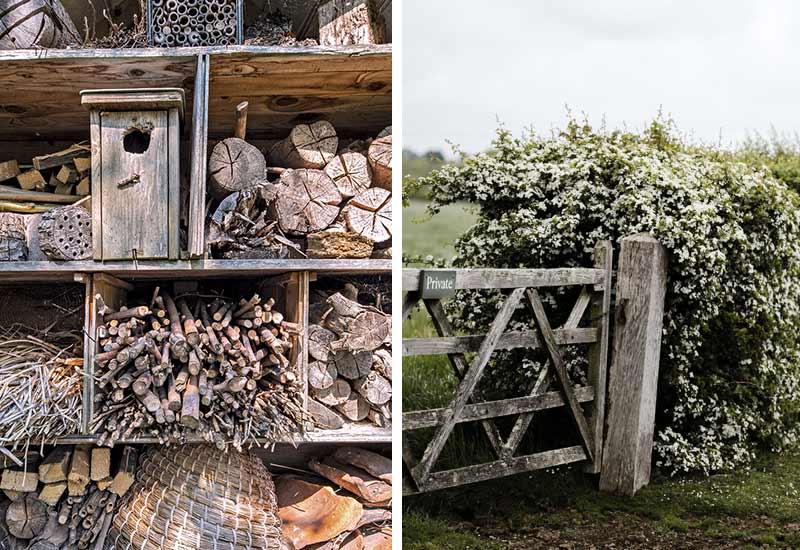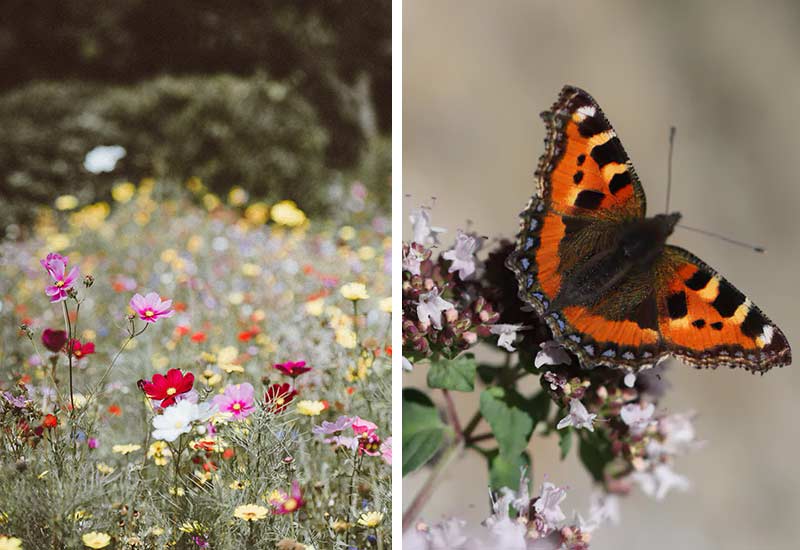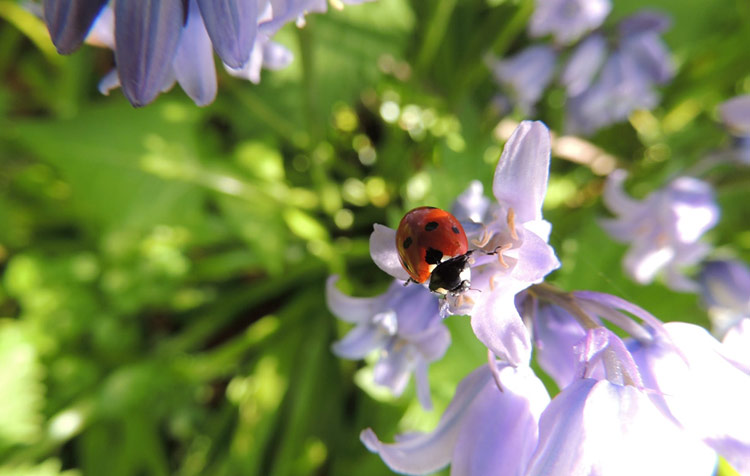You want to protect insects in your everyday life and stop the global insect extinction? Then you've come to the right place! No class of the animal world is as rich in species as that of insects. There are almost one million different species worldwide, all of which fulfill an important task in their respective habitats.
The little animals perform great feats, such as removing plant debris and carrion, creating fertile soil, and promoting the Plant growth through pollination. But global insect mortality is advancing in leaps and bounds and poses dramatic dangers.
In this article I would like to show you what you can do in your everyday life to preserve insect diversity. Let's go!
In advance, here is already a brief table of contents about the tips from this post:
- Inform about insect mortality
- Create nesting boxes for insects
- Eat organically, regionally and seasonally
- Bring out insects instead of slaying them
- Use natural plant protection and fertilizer
- Prefer vegan lifestyle
- Create food supply
- Do not eat insects
- Live more climate friendly
- Allow wild growth in the garden
1. Über das Insektensterben informieren
Wenn du wesentliche Fakten zum Insektensterben₁ kennst, wirst du dauerhaft motiviert sein, etwas dagegen zu unternehmen – zudem kannst du auch andere Menschen darüber aufklären. So klein Bienen, Käfer, Ameisen, Libellen und Borkenkäfer auch sein mögen – so wichtig sind sie für unser aller Leben. Warum? Hier einige Zahlen und Fakten:
- Decrease: The biomass of flying insects has declined by more than 75 percent overall between 1989 and 2014.
- Pollination: The growth of more than 85 percent of existing plant species depends on the pollination performance of insects. For example, apples, carrots or broccoli.
- World hunger: Pollinating insects are responsible for about 35 percent of global food production and up to 40 percent of the supply of essential micronutrients.
Without pollination, hardly any plant growth. The food remains out, problems like the worldwide famine are becoming more massive than ever and ecosystems are breaking down. If the insects die, ultimately we die too.
2. Nisthilfen für Insekten anlegen

A major cause of the insect decline is that, for example, in low-maintenance but also lifeless, gray gravel gardens, there is hardly any shelter left for the small animals. You have a garden? Then you can help them and provide a safe home. For example with Hecken, Totholz, sowie Laub- und Cairn - or a Insect hotel! You can even build it yourself from pine cones, woods and bushes - or simply hier besorgen*.
3. Biologisch, regional und saisonal ernähren
If you want to stop insect mortality, when you shop for food, try to buy food that is made from organic farming originate and for example without the use of synthetic pesticides and fertilizers are produced, prefer. You can recognize them, for example, by the Demeter, Bioland or classic organic seal. As far as possible, production takes place in harmony with nature, so that fallow fields and regular crop rotation leave more room for insects.
A regional and seasonal diet also helps to stop insect mortality. For example, prefer foods grown in your region/country and buy broccoli during the time it grows in this country. (around mid-May to October)
Good to know: At buy regionally and seasonal shoppingI have put together some more tips for you.
4. Insekten herausbringen statt erschlagen
Are wasps, flies or spiders regularly wandering around your four walls? Then please don't kill them! Take care instead in the first step by fly screens to ensure that they do not get in in the first place and look elsewhere. It also helps to regularly place the organic waste on the Compost heap to bring and meals, as well as fruits and vegetables, not to leave open.
And if a small animal does manage to get into the house, then catch it with a glass and bring it outside into the fresh air. If you want to protect insects and do something about insect mortality, you have to get creative.
Tip: Do vegans actually kill mosquitoes, flies and spiders? You'll get the answer in the linked post!
5. Natürlichen Pflanzenschutz und Dünger verwenden
It's not exactly surprising that the chemical destruction of weeds and supposed pests, also leaves devastating traces in the actually so species-rich insect world. Here are two crucial measures you can take to heart as sustainable alternatives to chemical bombs: Prevention and natural plant protection and fertilizers.
For example, avoid waterlogging by using planters with drainage. Loosening the soil also helps to protect it and the plants from pests. There are natural remedies against aphids (e.g. neem oil) and earth fleas (onion and garlic tea) - and you can also keep slugs away from your vegetables with the help of a slug fence.₂ All of these are sensible ways to stop insect mortality.
6. Vegane Lebensweise präferieren

By plant based diet and in general (as good as practical) not consuming products with animal ingredients, ingredients and materials, you protect all animals - including insects - in many ways. You save nature from the resource-intensive, environmentally destructive Factory farming.
The methane emissions of cattle or the Deforestation of the rainforests for animal feed cultivation, for example, are essential Factors contributing to global warming - and thus contribute to the main reason for insect mortality. Also the Water shortage, the land use, or the air pollution can be counteracted in this way.
Further contributions I would like to recommend to you:
7. Nahrungsangebot schaffen
You want to help the insects and stop their extinction? Since the scarcity of food is a major cause of their retreat, you should provide a rich buffet in your own greenery. This can be done easily, for example by selbst gebaute Bienentränken, Wildflower mixtures or insect-friendly plants such as Thyme, horn clover, quaking grass or meadow sage.
Tip: At Insect-friendly trees you will find a list of larger garden plants that wild bees, bumblebees, beetles, caterpillars, butterflies, flies and other insects adore.
8. Keine Insekten essen
A logical piece of advice: if you want to protect insects, you should stop eating them. Because even if most insects are farmed for burger patties, noodles or muesli and not wild caught, their consumption increases the acceptance in society for the consumption of insects. In times of insect mortality and countless vegan, animal-free, plant-based alternatives, it should actually be the other way around.
Honestly: I'm always amazed that people would rather eat grasshoppers or mealworms as a meat alternative instead of simply turning to the now myriad plant-based alternatives.
9. Klimafreundlicher leben

The man-made climate change is the main cause of the decline of insect species. But every person can also from problem to solution be, counteract global warming and protect insects.
For example, eat a plant-based, organic, regional and seasonal diet as much as possible, take the train and bike more, get green electricity and only buy the things you need. There really are countless possibilities, your personal climate budget to comply and in everyday life to live more climate friendly. Especially in the areas of nutrition, mobility, consumption, finance and housing.
10. Wildwuchs im Garten zulassen
Nothing is worse for insects than a gray, flat gravel garden! If they can't find food in your "greenery," they'll have to look elsewhere. A Wildflower corner and tall grass on the other hand, are welcome in the insect world. Get away from the idea that everything has to look "licked". Those who allow wild corners in their garden show foresight and help the insects.
Insektensterben stoppen und die Kerbtiere schützen – Mit einfachen Mitteln viel bewegen!
Without the free pollination service, we humans would hardly have anything to eat. The soil would also no longer be as fertile and would allow even lower crop yields. If we protect the insects, we ultimately also protect ourselves.
I hope you were able to glean some valuable information in this post about what each of us can do for the insect world and do for biodiversity can. Do you have any questions, tips or other important advice? Then I look forward to your comment.
Stay animal-friendly and sustainable,

PS: A insektenfreundlicher Garten ist übrigens auch ein Bird friendly garden. Find out in the linked article how you can regularly listen to the birds chirping from the hammock in the future. Have fun!
References:
₁ M. Sax, M. Tertilt, A. Hostert: This is why insect mortality is a real problem (as of Nov. 22, 2021), available at https://www.quarks.de/umwelt/tierwelt/darum-ist-das-insektensterben-ein-echtes-problem. [17.01.2022].
₂ R. Oswald: Natural plant protection in the garden and on the balcony (as of 29.05.2017), available at https://utopia.de/ratgeber/natuerlicher-pflanzenschutz. [17.01.2022].





